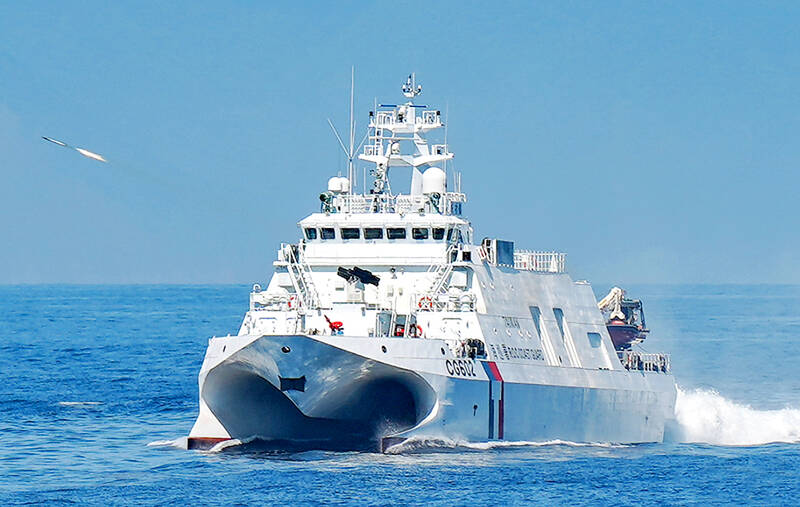The Executive Yuan has approved a Coast Guard Administration (CGA) plan to buy less-lethal weapons to avoid unnecessary risks to life while countering China’s “gray zone” actions, a senior official said yesterday.
The plan, which is to be conducted on a trial basis from next year to 2027 with an NT$86.24 million (US$2.72 million) budget, was approved earlier this month, the official said, speaking on condition of anonymity.
The CGA would procure 70mm rockets with “shock warheads,” 40mm flashbang grenades, stand-alone grenade launchers with single shot capacity and less-lethal handguns, they said.

Photo: Taipei Times file
Shock warheads would be better suited to maritime law enforcement missions than highly explosive, anti-armor loadings used in Chen Hai rocket systems on the coast guard’s Tuo Chiang-class corvettes, they said.
A defense official who also spoke on condition of anonymity said that shock rockets likely referred to a variant of the 70mm rockets developed by the Chungshan Institute of Science and Technology with a high-decibel sound to deter targets.
The institute would produce the munition based on the quantity and time specifications of the Ocean Affairs Council, they said.
Chen Hai rocket launchers are the main armament of Tuo-chiang class corvettes, with six systems equipped on each ship.
Separately, Taiwan on Friday received the first batch of land-based Harpoon anti-ship missile systems from the US, a military source said.
The source did not mention what equipment or system was included in the shipment, but said that the delivery was made via the Port of Kaohsiung.
The batch of arms is part of 32 vehicle launcher systems and 128 missiles that are to be delivered before 2026. They were purchased as part of a NT$71 billion deal of 100 systems, 400 missiles, four exercise missiles, 411 containers and 25 radar trucks, delivery of which is planned to be completed by 2028.
Installing and activating these systems would cost another NT$15.6 billion.
The RGM-84L-4 Harpoon Block II missiles earmarked for Taiwan are the most modern version of the Harpoon system, which the US is phasing out in favor of the Naval Strike Missile, the source said.
The Harpoon is a battle-tested system that has performed well in decades of operations, and its performance should meet the requirements for defending the seas around Taiwan, they said.
The RGM-84L-4 Harpoon Block II missiles designated for Taiwan are more advanced than the version used by the US Navy and have a greater effective range than the Taiwanese navy’s Hsiung Feng II anti-ship missiles, they said.
The radar trucks offered in the package would provide a mobile and survivable backup to fixed installations to boost Taiwan’s military command and control, they said.
The armed forces’ plan to establish a littoral combatant command in 2026 to control four strike groups and six land-based anti-ship missile bases are in progress, the Ministry of National Defense said.

The CIA has a message for Chinese government officials worried about their place in Chinese President Xi Jinping’s (習近平) government: Come work with us. The agency released two Mandarin-language videos on social media on Thursday inviting disgruntled officials to contact the CIA. The recruitment videos posted on YouTube and X racked up more than 5 million views combined in their first day. The outreach comes as CIA Director John Ratcliffe has vowed to boost the agency’s use of intelligence from human sources and its focus on China, which has recently targeted US officials with its own espionage operations. The videos are “aimed at

STEADFAST FRIEND: The bills encourage increased Taiwan-US engagement and address China’s distortion of UN Resolution 2758 to isolate Taiwan internationally The Presidential Office yesterday thanked the US House of Representatives for unanimously passing two Taiwan-related bills highlighting its solid support for Taiwan’s democracy and global participation, and for deepening bilateral relations. One of the bills, the Taiwan Assurance Implementation Act, requires the US Department of State to periodically review its guidelines for engagement with Taiwan, and report to the US Congress on the guidelines and plans to lift self-imposed limitations on US-Taiwan engagement. The other bill is the Taiwan International Solidarity Act, which clarifies that UN Resolution 2758 does not address the issue of the representation of Taiwan or its people in

US Indo-Pacific Commander Admiral Samuel Paparo on Friday expressed concern over the rate at which China is diversifying its military exercises, the Financial Times (FT) reported on Saturday. “The rates of change on the depth and breadth of their exercises is the one non-linear effect that I’ve seen in the last year that wakes me up at night or keeps me up at night,” Paparo was quoted by FT as saying while attending the annual Sedona Forum at the McCain Institute in Arizona. Paparo also expressed concern over the speed with which China was expanding its military. While the US

SHIFT: Taiwan’s better-than-expected first-quarter GDP and signs of weakness in the US have driven global capital back to emerging markets, the central bank head said The central bank yesterday blamed market speculation for the steep rise in the local currency, and urged exporters and financial institutions to stay calm and stop panic sell-offs to avoid hurting their own profitability. The nation’s top monetary policymaker said that it would step in, if necessary, to maintain order and stability in the foreign exchange market. The remarks came as the NT dollar yesterday closed up NT$0.919 to NT$30.145 against the US dollar in Taipei trading, after rising as high as NT$29.59 in intraday trading. The local currency has surged 5.85 percent against the greenback over the past two sessions, central